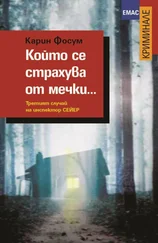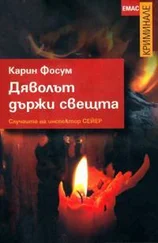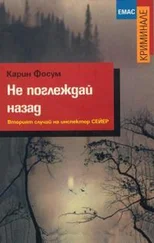‘Daddy.’
‘But he’s dead.’
‘Do you think I’ve stopped loving him because of that?’
Her reply was instant, and he was annoyed by his own stupidity. Who did he love most in the world? Elise, of course, and she was no longer there either.
‘And your mother?’ he asked carefully. ‘Does she also hold a special place?’
‘She was always so focused on my father,’ she said. ‘She wasn’t available.’
‘And are you bitter about that?’
‘No, not really. I generally focused on Daddy too, he took up so much room. He was electric. Do you understand what I mean by electric?’
‘A lot of energy?’
‘He made the whole house light up. He heated every room. But he also short-circuited every now and then, and then everything was cold and dark.’
Sejer wrote some more notes.
‘In what way was he ill?’
She did not answer for a while, looked the other way.
‘Something to do with his immune system,’ she said. ‘He was very prone to infections. I was left to my own devices a lot of the time. Mummy was always busy, and she worked so hard. What about your parents? Are they still alive?’
‘You don’t want to talk about your parents any more?’
‘No, you can tell me something about your parents now.’
He wondered what he should say about them. They were both dead, but had been hard-working, decent old-fashioned people with robust morals. They had been strict and had always expected a lot of him. Not in terms of his career, but in terms of his behaviour. They had brought him up to be polite, as they felt that was one of the most important aspects of being educated, but was not something that everyone learned. He thought through all of this, but decided to tell her about something else.
‘My mother’s hobby was pottery,’ he said. ‘She liked to make small clay figures. When they were dry, she took them to a place in town and had them fired. They turned red, like terracotta. She never glazed them. She put them on the windowsill or on a shelf, as ornaments, and there they stood. Our house was full of her figures.’
‘Were they nice?’
‘They were crooked and bent, and pretty awful, to be honest,’ he said. ‘She had no talent whatsoever. But we said nothing, my father and I, because she got so much pleasure from making them and maybe even liked them herself. Or perhaps the feeling of the soft clay in her hands helped to clear her mind. A little self-deception is a human right, don’t you think?’
Ragna smiled and agreed.
‘Have you kept any of them?’
‘Only three. They’re on the windowsill in my kitchen.’
‘A mother, father and child,’ she whispered. ‘You’re an only child, like me?’
‘Yes.’
‘Were they happy that you joined the police?’
Sejer’s smile was wider than usual. He looked first at Ragna, then down at the table.
‘My father was a reserved man who never said much. He gave a short nod when I told him, then he quickly disappeared into another room.’
‘Into another room?’ Ragna exclaimed. ‘Have you ever wondered what he did in the other room?’
‘I should imagine he went to the window, maybe even opened it. And that he stood there staring out at the garden. He probably wanted to cool down, as he was flushed with pride. Mother took every opportunity to tell people. Every guest who came to the house was met with the news: did I tell you that Konrad has joined the police?’
Ragna laughed as loudly as was possible for her. Her thin body shook.
‘And your mother made a special clay figure for you.’
‘She did. A big one.’
‘Now I feel I know them,’ she whispered.
‘And your parents,’ Sejer ventured, ‘were they proud of you?’
‘I think so,’ was her modest reply. ‘Of course they knew nothing about what would happen.’
She had started to count her steps.
Down to the rubbish bin by the road was forty-eight steps. From the house over to Irfan’s shop, sixty-four; to the bus stop, one hundred and fifty-seven. Counting gave her a sense of control, this was her territory and she paced it out precisely. Often when she went to the bus stop in the morning, she was surprised that the number was always the same. Never one hundred and sixty-eight, or one hundred and forty-nine. She looked down at her feet in their small shoes, to think that her steps were so precise. And what would she do if the number did change? Because that would mean that her overview was slipping, that her body had been knocked out of its natural, measured rhythm, that life was no longer safe. That external powers were taking over. She was walking back from the bus stop, her bag over her shoulder. It was heavy. She had taken four packets of twisted, purple candles, a goat’s milk soap and some cheap shampoo from the shop. Her purchases were written down and deducted from her pay. She stopped some distance from the driveway, stood there and looked around. She saw a big removal van in front of the Teigens’ house, and several men pushing and carrying. Going in and out of the old house, which was more or less identical to her own. The Thai family would be moving in before Christmas, with their own tables and chairs, and, according to Olaf, a massage table. Sooner or later she would bump into them, perhaps in Irfan’s shop, and she would have to embarrass them, as was the case with most other people she met. She would whisper her name, and then give them her well-practised tight smile, and if she felt like it, tell them about how she came to lose her voice. It would take no more than a few meagre seconds, then it would be done. But it never ceased to upset her. The fact that something so minor could knock her off course in this way. The Teigens had taken down the living-room curtains, she noted, and the rooms that were now being emptied seemed unnaturally bright. She compared them with her own windows, which had a warmer, welcoming glow. My house, she thought, and started to walk again. My own house. She got to the drive and opened the mailbox. There was of course something there. In fact, she could not remember it ever being empty. She took out the newspaper first, then the plain envelope addressed to ‘RIEGEL’.
She looked quickly up and down Kirkelina, to check if anyone had seen her, but there was no one there. She glanced over the road to Irfan’s shop — there was still light in the windows. And there was only a faint light in Olaf’s windows, so perhaps they were out. And the Teigens on the other side of the road were in the middle of moving. A car drove past, and then another, and the gust lifted the hem of her coat. She looked at the back of the envelope. The rubbish bin with its heavy lid was beside her. She should just throw the letter in without reading it. She was above all this nonsense, the letter belonged with the eggshells and leftovers, the letter was rotten. And she would slam the lid shut with such force that the removal men would think she had fired a shot. Then she would march quickly up to the house, forty-eight steps, put the newspaper on the table and demonstrate her defiance by pulling a face at whoever was trying to invade her space. Supper would be made. She would rattle around with the pots and pans and slam the cupboard doors. She would stride around the house like a general. She would read the newspaper. She had more important things to do than be scared of some idiot who was probably just bored and alone. He definitely had no friends; he was not someone who had anything to give. No one wanted to listen to him or go anywhere near him.
But what if she did all that? If she threw away the letter unread, how would she then manage to calm down? Would she just sit in a chair all night and wonder what the new message said? Would she lie in the dark under the duvet, her imagination running wild? No, she would not. She needed to keep up with him, know what he was planning. She would open the envelope, read it quickly and then throw it in the fire. Even though part of her brain said that would be basically the same as letting him in. She might as well open the door so he could step inside. She tore open the envelope all the same. She was agitated and flushed, angry and scared all at once.
Читать дальше












